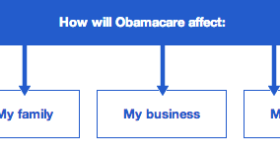Second Opinion is a weekly Q-and-A series that answers questions from San Diegans on the Affordable Care Act. Ask yours here.
The Question: How Can Former Inmates Sign Up For The Affordable Care Act?
Conrad Harris works in a bare-bones office on the second floor of a City Heights church. The organization he works for, Coming Home to Stay, helps former jail and prison inmates rebuild their lives in City Heights and southeastern San Diego.
"Getting insured may be, like, No. 3 on the list as far as re-entering society," Harris said. "First is you have to have some place to stay, second is you need some type of income to maintain the roof over your head, and then comes insurance."
Harris may have been a bit generous with his list knowing there was a health reporter in the room. He later said his clients often shy away from the insurance question altogether because they lack reading skills and are intimidated by all the jargon.
Here's Harris' question:
"With the population I deal with, how do they access the information to know if they're eligible for the program and what do they need to do to enroll into the program?"
The Takeaway: Inmates should start the enrollment process before leaving prison, but can find help once they're out.
For people who were incarcerated, the question that often comes before "Where do I get help?" is "Can I get help?" For some types of former felons, there are a lot of restrictions — from where they can live to whether they can get food stamps — once they leave prison.
Access to health care is not as rigid, and it's actually growing for this population.
The Affordable Care Act will expand Medi-Cal, the state's version of the Medicaid public health plan, to childless adults next year. Until now, public health plans really only covered families and the elderly, leaving young men, who disproportionately fill our prison cells, with few options for affordable coverage.
Getting this population insured is a major priority for public health officials. Under prison realignment, which asks California to reduce prison overcrowding, the corrections department is speeding up the pace of release and sending more former inmates into the community. Currently, 90 percent re-enter the community without health insurance, according to Community Oriented Correctional Health Services, a nonprofit that advocates for better connectivity between jails and health providers.
With the Affordable Care Act, those still in prison will continue to get care through the state and county corrections systems. But, starting next year, they'll be eligible for Medi-Cal once they're released. The can also participate in the state-run insurance exchange, Covered California.
Ideally, inmates should start the enrollment process before they're out. If they don't, they should talk to the counselors and social service providers they're put in touch with through the re-entry process – folks like Harris.
The Orders: Connect with Covered California and its assisters.
A better question might be "How does Harris find the information his clients need?"
After contacting Second Opinion, Harris got in touch with the San Ysidro Health Center and is having someone there come out to talk to his clients about their options.
The health center is one of several local organizations getting trained by Covered California to offer enrollment assistance. Others include Family Health Centers of San Diego, Neighborhood Healthcare, 2-1-1 San Diego and SAY San Diego.
Check out last week's Second Opinion: Is It Cheaper to Pay the Fine Than to Buy Coverage?










